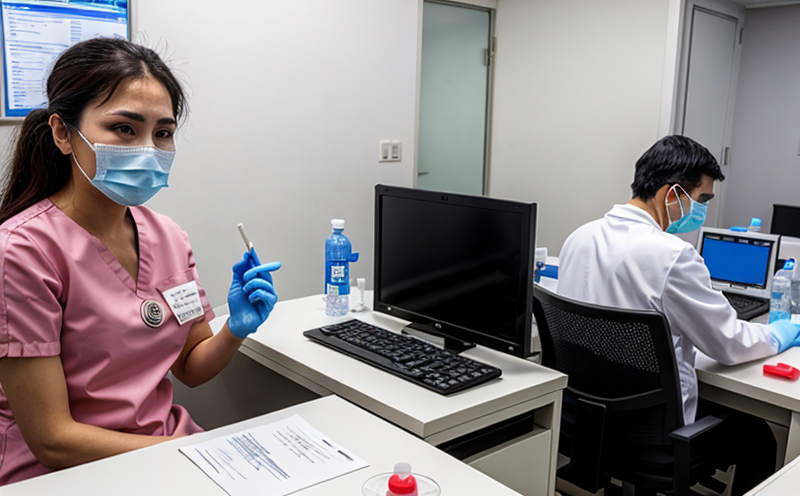Avian Metapneumovirus Antibody Testing in Turkeys
The testing of avian metapneumovirus (aMPV) antibodies in turkeys is a critical component for maintaining the health and productivity of turkey flocks. This diagnostic service helps monitor the presence of antibodies, which indicates past or current infections by this virus. The procedure provides valuable insights into flock immunity levels and aids in making informed decisions regarding vaccination strategies and biosecurity measures.
Avian metapneumovirus is a member of the Paramyxoviridae family and can cause respiratory disease in turkeys, leading to reduced growth rates, increased mortality, and economic losses. Regular monitoring through antibody testing allows for early detection of potential outbreaks, enabling proactive management techniques that minimize the impact on flock health.
The test typically involves collecting serum samples from turkey flocks. Specimen preparation includes thorough mixing with saline buffer before analysis using an enzyme-linked immunosorbent assay (ELISA). The ELISA method is highly sensitive and specific for detecting aMPV antibodies, providing results within 2-3 days of receiving the sample.
Interpretation of the test results involves comparing antibody titers to reference values provided by international standards such as ISO 15075-4. This ensures consistency with global best practices and facilitates effective communication between veterinarians, farmers, and other stakeholders involved in turkey production.
In summary, avian metapneumovirus antibody testing is an essential tool for monitoring flock health and optimizing management practices. By identifying trends in antibody levels over time, producers can better understand the dynamics of aMPV within their flocks, leading to more sustainable and profitable operations.
Scope and Methodology
The scope of avian metapneumovirus (aMPV) antibody testing in turkeys encompasses several key aspects. Primarily, it involves the collection of serum samples from turkey flocks for subsequent laboratory analysis. Specimen preparation is crucial; samples must be mixed with saline buffer to ensure accurate measurement.
The methodology primarily relies on ELISA technology due to its high sensitivity and specificity. The test targets aMPV antibodies, which are indicators of past or current infections in turkeys. This approach allows for the detection of even low levels of antibodies, providing comprehensive data on flock immunity status.
Following sample collection and preparation, the specimens undergo ELISA testing according to established protocols. Results are interpreted by comparing antibody titers against reference values provided by international standards like ISO 15075-4. This ensures that all tests adhere to global best practices, facilitating effective communication among stakeholders involved in turkey production.
Furthermore, the test results offer valuable insights into flock health and productivity. By monitoring changes in antibody levels over time, producers can identify potential risks early on and implement appropriate mitigation strategies. This proactive approach contributes significantly to maintaining optimal flock performance and minimizing economic losses associated with aMPV infections.
International Acceptance and Recognition
The importance of avian metapneumovirus (aMPV) antibody testing in turkeys extends beyond regional boundaries, as it is widely recognized internationally. Many countries have incorporated this diagnostic service into their national health programs for poultry. For instance, the World Organization for Animal Health (OIE) includes aMPV as part of its guidelines for controlling avian diseases.
International standards such as ISO 15075-4 provide comprehensive protocols that ensure consistent and reliable results across different laboratories worldwide. These standards are crucial for maintaining global consistency in the interpretation of test outcomes, thereby facilitating effective communication between veterinarians, researchers, and producers from various countries.
The acceptance of aMPV antibody testing is further bolstered by its alignment with international best practices in veterinary medicine and poultry husbandry. This recognition underscores the importance of this diagnostic service in global efforts to enhance turkey health and productivity.
Use Cases and Application Examples
- Pre-vaccination Monitoring: Testing before vaccination helps determine baseline antibody levels, ensuring that subsequent immunizations are effective.
- Post-vaccination Evaluation: After administering vaccines, testing is used to assess their efficacy and the resulting immune response in turkeys.
- Disease Outbreak Identification: During suspected outbreaks of aMPV, testing can quickly identify infected birds, guiding isolation and treatment measures.
- Biosecurity Assessment: Regular testing helps evaluate the effectiveness of biosecurity protocols in preventing disease spread.
- Veterinary Consultation: Diagnostic data from these tests supports veterinarians in making informed decisions about flock health management.
- Economic Decision-Making: Insights gained through antibody testing contribute to strategic planning aimed at maximizing profitability and minimizing losses.
The versatility of avian metapneumovirus antibody testing makes it indispensable for various stakeholders, including veterinarians, producers, and researchers. By leveraging this diagnostic tool effectively, all parties can work together towards maintaining robust turkey flocks and achieving sustainable poultry production.





